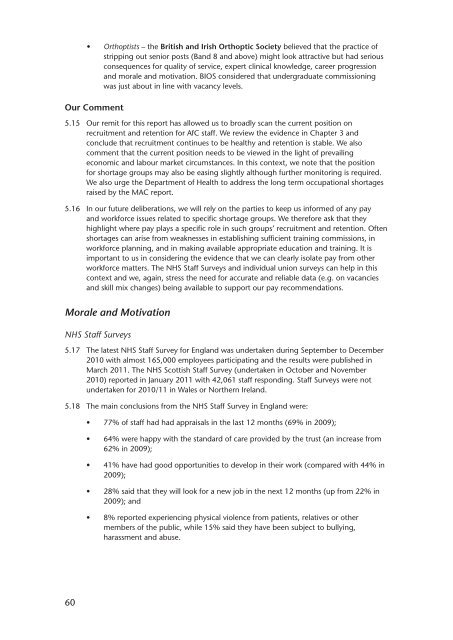NHS pay review body: twenty-sixth report 2012 - Official Documents
NHS pay review body: twenty-sixth report 2012 - Official Documents
NHS pay review body: twenty-sixth report 2012 - Official Documents
Create successful ePaper yourself
Turn your PDF publications into a flip-book with our unique Google optimized e-Paper software.
60<br />
• Orthoptists – the British and Irish Orthoptic Society believed that the practice of<br />
stripping out senior posts (Band 8 and above) might look attractive but had serious<br />
consequences for quality of service, expert clinical knowledge, career progression<br />
and morale and motivation. BIOS considered that undergraduate commissioning<br />
was just about in line with vacancy levels.<br />
Our Comment<br />
5.15 Our remit for this <strong>report</strong> has allowed us to broadly scan the current position on<br />
recruitment and retention for AfC staff. We <strong>review</strong> the evidence in Chapter 3 and<br />
conclude that recruitment continues to be healthy and retention is stable. We also<br />
comment that the current position needs to be viewed in the light of prevailing<br />
economic and labour market circumstances. In this context, we note that the position<br />
for shortage groups may also be easing slightly although further monitoring is required.<br />
We also urge the Department of Health to address the long term occupational shortages<br />
raised by the MAC <strong>report</strong>.<br />
5.16 In our future deliberations, we will rely on the parties to keep us informed of any <strong>pay</strong><br />
and workforce issues related to specific shortage groups. We therefore ask that they<br />
highlight where <strong>pay</strong> plays a specific role in such groups’ recruitment and retention. Often<br />
shortages can arise from weaknesses in establishing sufficient training commissions, in<br />
workforce planning, and in making available appropriate education and training. It is<br />
important to us in considering the evidence that we can clearly isolate <strong>pay</strong> from other<br />
workforce matters. The <strong>NHS</strong> Staff Surveys and individual union surveys can help in this<br />
context and we, again, stress the need for accurate and reliable data (e.g. on vacancies<br />
and skill mix changes) being available to support our <strong>pay</strong> recommendations.<br />
Morale and Motivation<br />
<strong>NHS</strong> Staff Surveys<br />
5.17 The latest <strong>NHS</strong> Staff Survey for England was undertaken during September to December<br />
2010 with almost 165,000 employees participating and the results were published in<br />
March 2011. The <strong>NHS</strong> Scottish Staff Survey (undertaken in October and November<br />
2010) <strong>report</strong>ed in January 2011 with 42,061 staff responding. Staff Surveys were not<br />
undertaken for 2010/11 in Wales or Northern Ireland.<br />
5.18<br />
The main conclusions from the <strong>NHS</strong> Staff Survey in England were:<br />
•<br />
•<br />
•<br />
•<br />
•<br />
77% of staff had had appraisals in the last 12 months (69% in 2009);<br />
64% were happy with the standard of care provided by the trust (an increase from<br />
62% in 2009);<br />
41% have had good opportunities to develop in their work (compared with 44% in<br />
2009);<br />
28% said that they will look for a new job in the next 12 months (up from 22% in<br />
2009); and<br />
8% <strong>report</strong>ed experiencing physical violence from patients, relatives or other<br />
members of the public, while 15% said they have been subject to bullying,<br />
harassment and abuse.
















